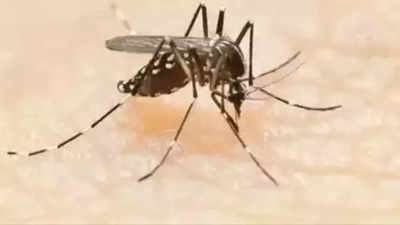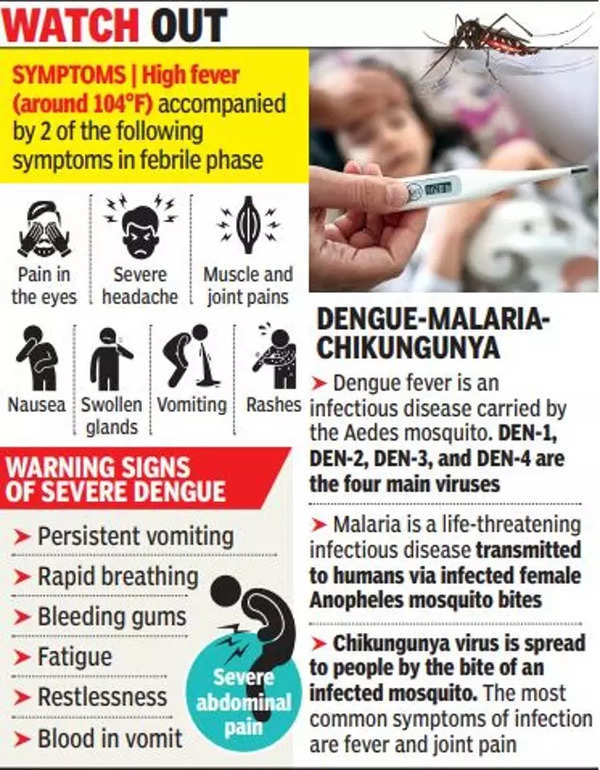- News
- City News
- delhi News
- Dengue, malaria fears add to Delhi woes
Trending
This story is from September 1, 2022
Dengue, malaria fears add to Delhi woes
Cases of vector-borne diseases, such as dengue and malaria, could rise in Delhi if the city receives heavy rainfall in September, experts have said.

Image used for representative purpose only
NEW DELHI: Cases of vector-borne diseases, such as dengue and malaria, could rise in Delhi if the city receives heavy rainfall in September, experts have said.

According to MCD, 205 dengue cases have been recorded this year so far - 23 in January, 16 in February, 22 in March, 20 in April, 30 in May, 32 in June, 26 in July and 36 in August. DEN-1, DEN-2, DEN-3 and DEN-4 are the four main strains that cause the disease.Experts have stressed that identifying the strain will be the most crucial step if the cases are to be kept under check.
"Once we know the strain, it will indicate if there is going to be a surge or if the cases will remain mild. So far, the trend suggests we could see a rise in the number of cases," said Dr Ashutosh Biswas, director, AIIMS Bhubaneswar.
"If there isn't much rainfall in the coming days, chances of a rise in dengue or malaria cases could remain low. But if it rains heavily like last year, there is a possibility we could witness a high number of dengue cases," Dr Biswas added.
Last September, the city had received heavy rainfall, which was followed by a spike in dengue cases. Humidity and temperature are also critical factors when it comes to breeding of mosquitoes. Though the dengue fatality rate has remained low in the past few years, the risk cannot be ignored.
Dr Biswas said a person remains at higher chances of being infected with dengue for a second time as a new strain can attack the body again and lead to development of serious symptoms.
"If a new strain attacks the body, one can develop serious symptoms. It is called antibody-dependent enhancement. The same strain is unlikely to affect the same person. It's not a contagious or air-borne disease and the best way to avoid it is by keeping the neighbourhood clean and free of stagnant water, because that is where mosquitoes breed," added Dr Biswas.
Last year, 9,613 dengue cases were recorded in the city, the highest since 2015, along with 23 deaths - the maximum since 2016. In 2015, Delhi had witnessed a massive dengue outbreak, with the number of cases crossing 10,600 in October. It was Delhi's worst dengue outbreak since 1996.

According to MCD, 205 dengue cases have been recorded this year so far - 23 in January, 16 in February, 22 in March, 20 in April, 30 in May, 32 in June, 26 in July and 36 in August. DEN-1, DEN-2, DEN-3 and DEN-4 are the four main strains that cause the disease.Experts have stressed that identifying the strain will be the most crucial step if the cases are to be kept under check.
"Once we know the strain, it will indicate if there is going to be a surge or if the cases will remain mild. So far, the trend suggests we could see a rise in the number of cases," said Dr Ashutosh Biswas, director, AIIMS Bhubaneswar.
Apart from the strain, other factors like rain are responsible for the spread of vector-borne diseases.
"If there isn't much rainfall in the coming days, chances of a rise in dengue or malaria cases could remain low. But if it rains heavily like last year, there is a possibility we could witness a high number of dengue cases," Dr Biswas added.
Last September, the city had received heavy rainfall, which was followed by a spike in dengue cases. Humidity and temperature are also critical factors when it comes to breeding of mosquitoes. Though the dengue fatality rate has remained low in the past few years, the risk cannot be ignored.
Dr Biswas said a person remains at higher chances of being infected with dengue for a second time as a new strain can attack the body again and lead to development of serious symptoms.
"If a new strain attacks the body, one can develop serious symptoms. It is called antibody-dependent enhancement. The same strain is unlikely to affect the same person. It's not a contagious or air-borne disease and the best way to avoid it is by keeping the neighbourhood clean and free of stagnant water, because that is where mosquitoes breed," added Dr Biswas.
Last year, 9,613 dengue cases were recorded in the city, the highest since 2015, along with 23 deaths - the maximum since 2016. In 2015, Delhi had witnessed a massive dengue outbreak, with the number of cases crossing 10,600 in October. It was Delhi's worst dengue outbreak since 1996.
End of Article
FOLLOW US ON SOCIAL MEDIA










